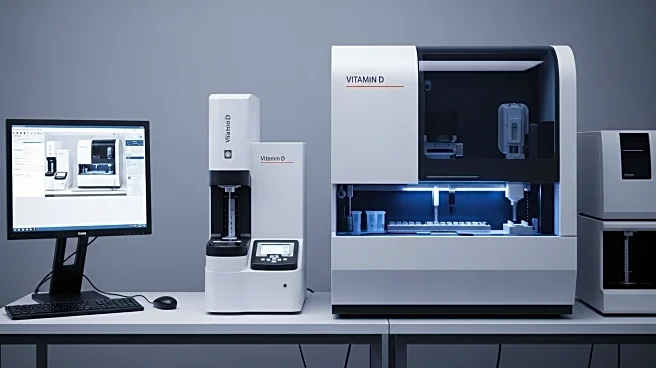What's Happening?
Roche has announced that its Ionify® 25-Hydroxy Vitamin D total assay has been categorized as 'Moderate Complexity' under the Clinical Laboratory Improvement Amendments of 1988 (CLIA) by the U.S. Food and Drug Administration (FDA). This marks the first time a mass spectrometry-based test has received this designation, allowing a broader range of clinical laboratories to access advanced testing. The assay operates on Roche's cobas® i 601 analyzer, part of the cobas® Mass Spec solution, which combines mass spectrometry's sensitivity and specificity with a standardized workflow. This development is significant as it simplifies complex testing processes, traditionally limited to specialized labs, and reduces variability across different laboratories.
Why It's Important?
The CLIA 'Moderate Complexity' categorization for Roche's Vitamin D test is a significant advancement in the field of diagnostics. It allows more laboratories to perform highly accurate tests efficiently, which can lead to better-informed clinical decisions and improved patient care. This development could potentially reduce the need for outsourcing advanced testing, thereby lowering costs and increasing accessibility. The move also positions Roche as a leader in the diagnostics industry, potentially influencing other companies to pursue similar advancements in mass spectrometry testing. This could lead to broader adoption of such technologies, enhancing the overall quality and efficiency of healthcare diagnostics.
What's Next?
Roche plans to expand its U.S. pipeline for the cobas® Mass Spec solution, with additional mass spectrometry assays anticipated to launch globally. The company is also participating in the upcoming Mass Spectrometry & Advances in the Clinical Lab (MSACL) Conference in Montreal, Canada, where it will showcase its advancements. As more labs adopt this technology, there may be increased collaboration between Roche and healthcare providers to further integrate these solutions into routine diagnostics. This could lead to further innovations in personalized healthcare and potentially influence regulatory standards for diagnostic testing.











